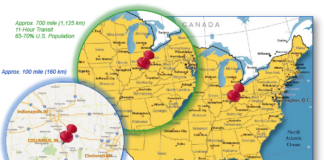
This week comes news from Chattanooga that the mid-sized Tennessee city is preparing to activate the fastest broadband service in the world. That’s 1 gigabit per second, ten times faster than the high-speed digital goal the U.S. government recently declared for the nation.
The Feds say we must achieve the puny standard of 100 megabits per second by 2020. South Korea, with an economy less than one-tenth the size of the GDP of the United States, plans to offer 1 gigabit per second service nationally by 2012. Chattanooga, best known for its lumbering choo-choo, says it will have 1 gig service available to all businesses and residents by the end of the year.
Do we detect a pattern here?
Yes, the federal government moves with the speed of a large dinosaur trapped in a tar pit. If our fast-as-molasses national broadband upgrade doesn’t prove this to you, here are some other recent showstoppers from the goliath in Washington:
— Two years after the global financial meltdown, the Securities and Exchange Commission says it finally is “narrowing the focus” of its investigation of accounting practices at Lehman Brothers. However, the SEC admits it is not close to determining whether anything unusual was going on at the defunct nexus of the fiscal calamity in the days leading up to Sept. 15, 2008.
— Two weeks after the fifth anniversary of Hurricane Katrina, the U.S. Department of Housing and Urban Development has released its first comprehensive housing survey of New Orleans since Katrina struck. HUD says it has “discovered” a 13 percent drop in housing units in the Big Easy.
Perhaps HUD and FEMA can now join forces to conduct a secondary investigation to determine if the loss of 75,000 housing units in New Orleans was caused by an act of nature. Must have been something really big, like maybe a monster hurricane that everyone watched on TV five years ago.
But here’s our favorite:
The federal Bureau of Land Management held a week of hearings last month to consider the “artist” Christo’s proposal to drape a 42-mile-long strip of fabric over the Arkansas River in Colorado.
Christo says he has spent 18 years working on the logistics of this project. The logistics go something like this: put up poles on both sides of river, attach fabric. Perhaps Christo had trouble choosing a color.
The Bureau of Land Management says it will spend at least six more months studying this important concept before rendering a decision. Trivial stuff like exploding oil pipelines, mine disasters and eminent domain for alternative energy projects will just have to wait.
We’re tempted to ask the government how it managed to move a river from Arkansas to Colorado. Did the Army Corps of Engineers have anything to do with that?
We’d ask, but the dial-up connection to the Federal Information Bureau keeps crashing.












![[VIDEO] Get More for Your Business in Ardmore. Oklahoma](https://businessfacilities.com/wp-content/uploads/2024/02/maxresdefault-324x160.jpg)
